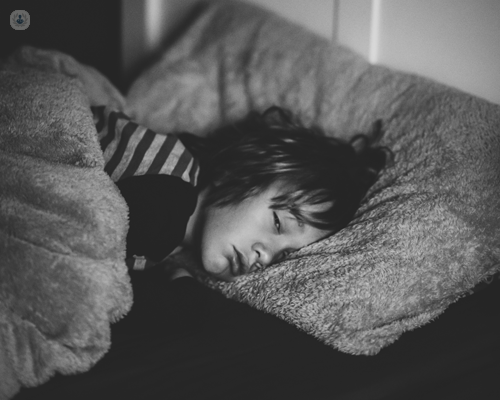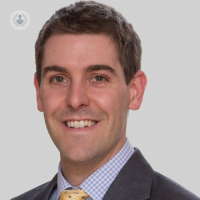Paediatric sleep disorders: An expert overview of medical conditions such as sleep apnoea
Escrito por:A good night's sleep is easier said done, especially with children that have sleep apnoea.
Here to discuss this condition, which can significantly affect both the child's and their family's/carers' quality of life, is leading consultant paediatric otolaryngologist Mr Christopher Pepper.

Are sleep apnoea and snoring related? If so, how?
Sleep apnoea and snoring are absolutely related. What tends to happen when we're awake, is that our airways are open; the muscles are working all of the time to maintain a good airway for breathing. When we fall asleep, all of those muscles tend to relax and allow the airway to become a little bit narrower.
Typically, as those muscles relax, sometimes you get vibration which is what we hear as snoring. That's the vibration of the muscles in the back of the throat. For some kids and adults, particularly if they have other problems, for example; large tonsils and adenoids which can narrow the space a little further, as those muscles relax further, the space gets very narrow.
At times, the snoring is very loud; often the children are working quite hard to breathe because their airway is narrow and at times, in fact, that airway can block off completely which is what we call an apnoea. It's kind of a breath halt, and then the body has to wake itself up to restart the breathing.
What different types of snoring are there?
Most snoring is quite similar, but the sound can vary a little bit between one person and the other. Generally snoring is quite a defined problem and it's very much the vibration of the muscles at the back of the nose and at the back of the throat. Some can be a little higher pitched and some are a little lower, but typically it's that vibrating-type sound.
You can make other airway sounds, but in fact, as children's ENT surgeons, we learn to use sounds to help predict where the problem is. Typically, in other parts of the breathing airway, if there are problems there, they make different sounds.
Really, snoring can vary a little bit but typically it's quite isolated to the nose and throat area.
Why do some of us snore during sleep and some others don't?
To some degree, it's a little bit due to all of us being put together slightly differently. The exact size and shape of the back of our nose and throat is a little bit different. Also, the length and shape of our neck varies a little bit. Which means that for some people, even when they're asleep, their airways is wide open and there's no sound, but for some of us there's some snoring with a little bit of vibration. To some degree, that is normal.
However, for some people there are other factors, for example, children with large tonsils or adenoids. It could be other aspects such as a very blocked nose or possibly nasal polyps, for example.
Is snoring a serious health issue?
Snoring on its own is very common. It's estimated that five to ten per cent of the childhood population snore to some degree. If it's just snoring, then it poses no health risk at all and it's very reassuring. However, snoring can be an indicator that there are other breathing problems going on.
If the child is snoring, but the breathing is comfortable, so by that there's no work of breathing; the child isn't sucking in at the neck and their chest isn't working hard with their muscles, and they aren't sucking in under their ribs, and the breathing is very calm and comfortable, then I would be very reassured and usually no treatment is needed.
However, for some children we notice the snoring because it's loud and that it's a marker of other problems. Such as, when they fall into a deeper sleep the muscles relax further and further and the child is struggling. When this is happening, the body has to keep waking itself up in order to normalise the breathing and ensure there's enough oxygenation to the body and to the brain.
My analogy is often like an adult; somebody might poke them in the ribs every 10 or 20 minutes all night. They may not necessarily fully wake up, but their sleep can be very disturbed. That is a bit like sleep apnoea in children, with bad snoring so that the body has to keep waking itself up in order to resolve the breathing. The difficulty and the problem is that the sleep quality is severely disturbed.
This wakening process often makes children very restless and very sweaty, and often goes with some gasping events after they've been holding their breath. When it reaches that point, then I have more concern and usually we treat the problem.
What are some of the most concerning sleep disorders that require treatment?
There are various sleep disorders. I'll deal with the breathing-related sleep disorders.
The first one is really very rare, and that's what we call central sleep apnoea. That's actually a problem with the signals coming from the sleep centre inside the brain, which controls the breathing. That's something I look after with my colleagues but it's very unusual.
In reality, the majority of what I see is sleep apnoea although it's a spectrum. Some people may only have it at times if they have a viral upper respiratory infection, for example. Some people may have it a lot of the time, even when they're well. It's a spectrum called sleep-disordered breathing, and at the more severe end it's what's called obstructive sleep apnoea.
How important is sleep?
We as adults, and particularly those with children, understand sleep is vitally important. If we've had a child waking us up several times overnight, we really don't feel well in the morning. We lack energy and sometimes our concentration can be really affected. That applies exactly the same to children, but I would say even more so.
Children are growing, they're developing, so certainly those for whom their sleep is disturbed and I see that a lot with children with sleep apnoea, it can affect their concentration, their memory, their behaviour. A lot of people describe a very labile (unpredictable) mood, so at times they're very happy and times they're very upset.
If you're looking for expert attention regarding your child's sleep apnoea or other sleep disorders, arrange a consultation with Mr Pepper via his Top Doctor's profile.


